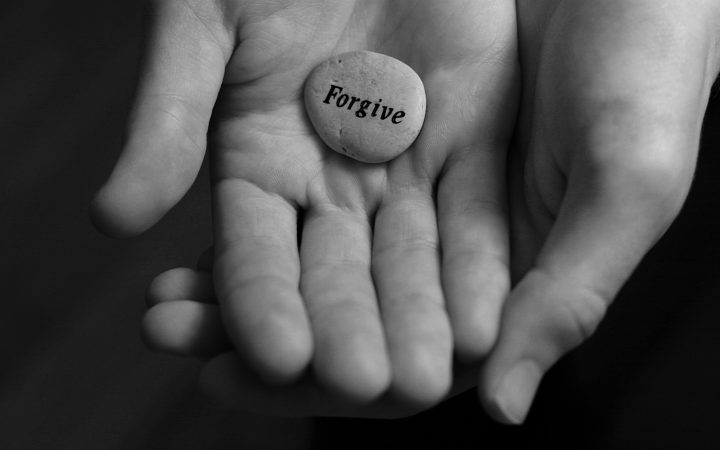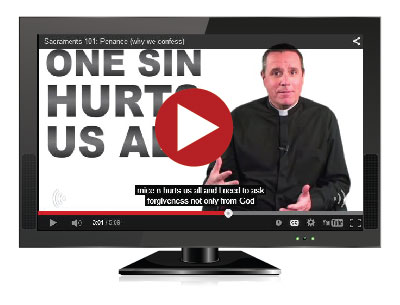Reconciliation: Parenting Points

The difference between ‘I’m sorry’ and ‘forgive me?’
Saying ‘sorry’ is different to asking for ‘forgiveness’. When we say sorry to someone, it is an ‘I-centred’ statement expressing sympathy, but not necessarily inferring that we take any responsibility. As such, it requires nothing from the person to whom we say it. It is always good to say ‘sorry’ but it is nowhere near as hard to do, or as effective, as asking for forgiveness.
Asking for forgiveness is an act of vulnerability; not only does it put us in a position of accepting responsibility for hurting the other, it is a request to be invited back into unity with the person we have hurt. Full reconciliation can only occur in a relationship when we say sorry and ask for forgiveness. This is the basis of the Sacrament of Reconciliation, but applies equally to any intimate relationship such as with a spouse, a child or family and school/parish community members.
Five Ways to Lead by Example
ONE: Practice Repentance
When you hurt or disappoint your spouse or a family member, accept responsibility, apologise and ask for forgiveness. Your willingness to admit your faults is a powerful role model.
TWO: Practice Humility
Nothing interferes more with our willingness and capacity to seek reconciliation than pride. Humility is the counter point of pride so seek it in prayer and meditation.
THREE: Practice Mercy.
When others are wounded, listen compassionately and help them move towards forgiveness.
FOUR: Practice Forgiveness.
Resist the temptation to hold onto grudges against others who have hurt you. Living under the burden of resentment and unforgiven wounds is like a cancer – it destroys our joy and leads us to act in ways that harm others.
FIVE: Practice the Sacrament
Go to the Sacrament of Reconciliation yourself. If it’s been awhile, remember how the Father of the Prodigal Son waited for his return. Our Father in heaven awaits your return with the same urgency. Not sure what to do? Just let the priest know and he’ll guide you.
Step by Step: Reconciliation made simple
Before
Just as it’s important to be sincere and in the right frame of mind when we apologise to a person whom we’ve offended, so also do we need to be appropriately prepared and sorrowful when we go to the Sacrament of Reconciliation. This is primarily what the Examination of Conscience is about.
Download from our selection of resources.
During
- Make the Sign of the Cross and tell the priest how long it has been since your last confession.
- Name your sins – all of them! The priest may talk with you a bit about how you can make amends and avoid falling into sin again.
The priest will also give you some penance appropriate to your circumstances. - Make an Act of Contrition a short prayer of sorrow and plea for God’s mercy. You can make up your own or use the following:
O My God, I am very sorry that I have sinned against you, because you are so good and with your help I will try not to sin again. - Absolution The priest says a prayer granting forgiveness and makes the Sign of the Cross. You say ‘Amen’, leave and do your penance.
After
Make sure you do your penance and enjoy the grace and lightness of soul!
Peacemaking in the Family
As parents, we often end up being the brokers of peace in the household as we get called in to adjudicate arguments and mete out judgement. It has to one of the most unpleasant aspects of being a parent, but it is also one of those precious teachable moments. All too often, in desperation we force an apology from one and demand acceptance of it from the other, with all of us knowing full well that the issue is far from resolved.
Here’s a framework that can work a whole lot better. Finesse it for yourself first and then you can coach your children.
- Stop

The first step is to stop. When we are upset, we become emotionally flooded and physiologically prepared for flight or fight.
In this state, our capacity for empathy and rational thinking is impaired. The only sensible thing to do is to take a time out and self-soothe.
This might be some deep breathing, taking a walk, having a cup of tea or praying for God’s help. The most important thing is not to brood. You don’t want to give the issue more oxygen keeping yourself in a state of defensiveness. It takes at least 20 minutes for our body to physiologically recover, so don’t rush this step. - Reflect
Before coming together, spend some time thinking about your part in the disagreement or upset. Even if you didn’t start the argument, you most likely made it worse by reacting aggressively or unkindly.
This is not a time to prepare a new attack! It’s a time to reach out in humility and sincerity to the other. Use the following as a guide.
a. I am sorry for… (Identify what words or actions you used that caused hurt to the other person).
b. It was wrong because… (Be specific about how your actions or words harmed the other. Think about how the other may be feeling – can you empathise with them?).
c. In the future I will… (What could you do differently in the future to avoid a repeat of this situation? Make this a positive statement of what you will do, rather than a negative statement of what you won’t do).
d. Please forgive me. (We can’t make anyone forgive us; we can only ask in sincere humility). - Connect
Find a good time to talk when both of you can give your full attention. Make sure that your apology has all four elements: an expression of sorrow, empathy, a commitment to change and a request for forgiveness.
See how a teacher applied this idea in her classroom to great effect…
A Better Way to Say SorryPreparing your children for their first reconciliation
- Talk about it
In the lead up to their First Reconciliation use your family mealtime to talk about God’s mercy and love. Talk about people you know who are very forgiving and compassionate. Share a time when you needed forgiveness. - Prepare yourself
Forgive someone against whom you hold resentment. Reflect on how your resentment is making you hurt others. Make a decision to let go and forgive. - Set an example
Go to reconciliation yourself, at your child’s reconciliation if possible, or immediately before or after. If you are a non-Catholic parent, and it is offered in your parish, go forward for a blessing from the priest.
After the big day…
Much like a wedding, your child’s First Reconciliation is the first day of the rest of their faith journey. So how do we continue to nurture, encourage and guide our children until they can take adult responsibility?
Do…
- …affirm your child’s worthiness. Your child needs to know their inherent goodness and their power to love and make loving choices.
- …take him/her to the Sacrament of Reconciliation at regular intervals during the year, especially during Advent and Lent.
- …find some child-friendly movies and books with forgiveness and reconciliation as a theme to watch and read.
- …forge a habit of regular Reconciliation yourself. If you don’t have a regular habit, your kids won’t either.
Don’t…
- … use the Sacrament as a threat or punishment! (eg. “If you do that again, I will send you to Confession!”) Treat the Sacrament with respect, as a special gift to experience God’s mercy and love.
- … guilt-trip your children into going to Reconciliation. Keep inviting and creating the opportunity and let God do the rest.
- … neglect your own spiritual growth. We cannot lead where we have not been and sometimes we can be more committed to our child’s growth in holiness than we are to our own!
Resources
Act of Contrition Cards
A business card-sized Act of Contrition card to keep handy in your wallet or purse.
First Reconciliation Prayer Invitations
Invite family and friends to pray for your child as they prepare for this sacrament. Don’t forget your child’s Godparents!




